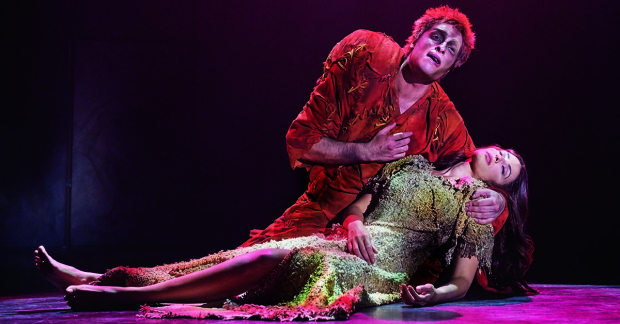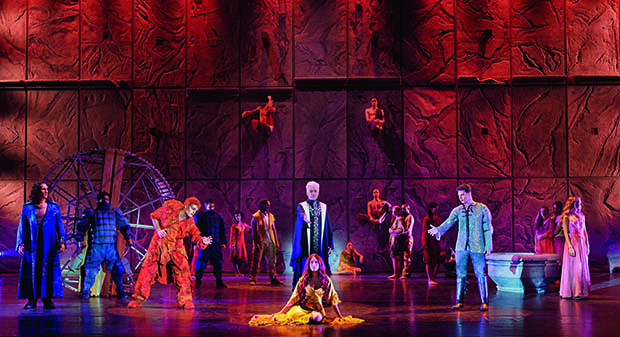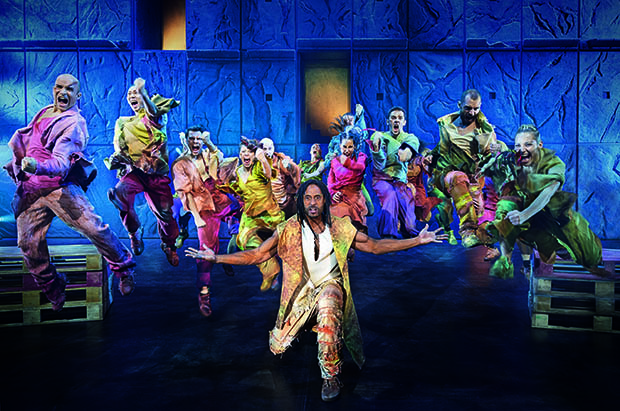Review: The Forced Grandeur of Notre Dame de Paris

(© Alessandro Dobici)
Imagine a sung-through musical that's made up almost entirely of power ballads, from the electric guitar underlining its slow-burn opening to its final, soaring glory note. That's the best way to describe the experience of watching Notre Dame de Paris, the phenomenally popular French pop-rock musical that's finally making its New York premiere after becoming a hit at its Paris world premiere in 1998. Perhaps those who have been following the show in the intervening 24 years before this ongoing two-week run (it began performances July 13) at Lincoln Center's David H. Koch Theater will be gratified that it has arrived. Others will be left wondering why such an airless, wearying experience has become an international sensation.
Luc Plamondon and Richard Cocciante's musical is the umpteenth adaptation of Victor Hugo's 1831 novel Notre Dame de Paris (often known in English as The Hunchback of Notre Dame), but this version does at least offer an intriguing measure of faithfulness to its source material. Most stage and screen adaptations have zeroed in on the physically deformed but kindhearted Quasimodo's love for Romani street dancer Esmerelda. Hugo's book is more panoramic in its scope, painting a broader portrait of a society on the verge of seismic social, political, and artistic change. Thus, the musical opens with "Le Temps des cathedrals," Gringoire (Gian Marco Schiaretti) the troubadour's ode to the eponymous Notre Dame cathedral; and includes numbers such as the Act 2 opener "Florence," in which Gringoire and Notre Dame archdeacon Frollo (Daniel Lavoie) argue about just how much of a danger Johannes Gutenberg's recent invention of the printing press poses to French society in the 15th century.
Though such numbers tantalize in sketching out the show's historical backdrop, Notre Dame de Paris is ultimately more about romantic melodrama than social commentary. Esmerelda (Hiba Tawaji) is at the center of a tangled romantic web, not only with Quasimodo (Angelo Del Vecchio) but also with Frollo and Gringoire, who fall in love with her. She, however, is hung up on Phoebus (Yvan Pedneault), captain of King Louis XI's cavalry, who reciprocates her affection even though he's technically engaged to Fleur-de-Lys (Emma Lépine). But it's Quasimodo who's the purest in his love for her, seeing in her a fellow outsider and kindred spirit — a connection that is solidified when Esmerelda is the only one to treat him decently as he's being publicly tortured.

(© Alessandro Dobici)
Notre Dame de Paris bills itself as a "musical spectacle," and the emphasis is very much on the spectacle. Gilles Maheu, who directed the production, has peppered the show with all sorts of extraneous bells and whistles, especially on the choreographic front. Dancers and acrobats abound on Christian Rätz's minimalistic set, lined toward the back of the stage with the marble walls of the Notre Dame cathedral, with these supporting performers executing Martino Müller's flashy but inexpressive choreography in the background even as a character belts out their innermost feelings. Such distracting bits of stage business put us less in the frame of mind of 15th-century France than of 20th-century Las Vegas; all that's missing, really, are flashing lights to emphasize the slick superficiality of it all.
But then, Maheu seems to be taking his signals from Cocciante's score, which, for the most part, operates at two modes: loud and louder. No doubt Cocciante, a popular French singer-songwriter before embarking on this endeavor, has a knack for the catchy hook, but his idea of melodic development is simply to ratchet his yearning melodies to higher keys, as if such modulations were enough to indicate increasing passion. Far from enveloping us emotionally in the story he and Plamondon, who wrote the prosaic lyrics, are telling, the cumulative effect is to crowd out human feeling altogether, killing any sense of genuine intimacy and connections toward the characters.
Let it not be said that the cast, performing in French (surtitles appear on monitors on both sides of the stage), doesn't at least commit to the bombast, selling all of the musical numbers with genuinely impressive voices that ring out to the David H. Koch Theater rafters. That said, only Lavoie stands out as giving a well-rounded performance, pulling us into the depths of the archdeacon's tortured, hypocritical soul as he wrestles with both his religious convictions and his forbidden desire for Esmerelda. It's a bad sign when the most sympathetic character in any adaptation of Hugo's novel is arguably the most dastardly — but, watching the numbingly "operatic" Notre Dame de Paris, one gets the sense that none of the creators thought about character so much as about how to beat us into submission at the supposed grandeur of it all.

(© Alessandro Dobici)












